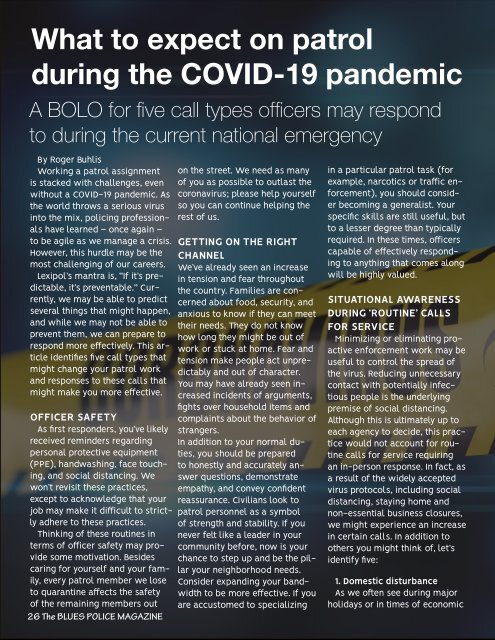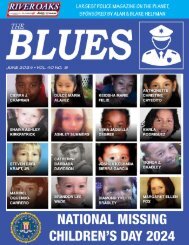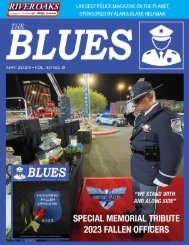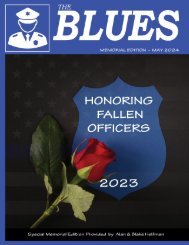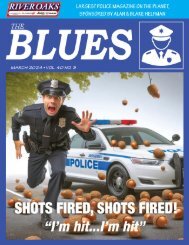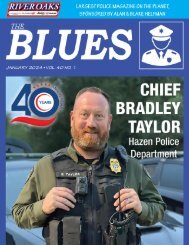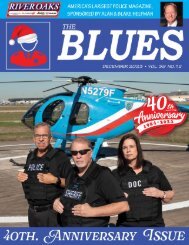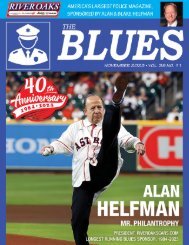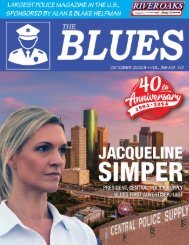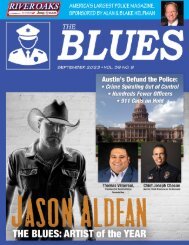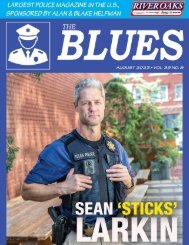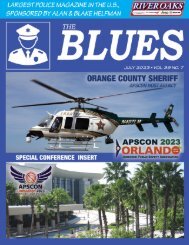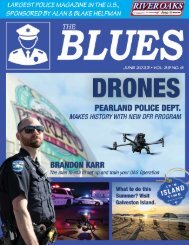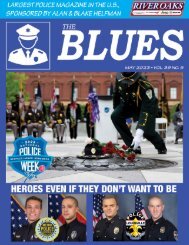April 2020 Blues Vol 36 No 4
April 2020 Blues Vol 36 No 4 Surviving COVID - 19
April 2020 Blues Vol 36 No 4
Surviving COVID - 19
- TAGS
- disenfectant
- face-mask
- protect-police-against-virus
- harris-county-sheriff
- police-news-houston
- police-news-texas
- houston-police
- blues-police-newspaper
- blues-police-magazine
- the-blues
- cops-mag
- cops
- war-stories
- police-war-stories
- surviving-covid
- police-publication
- police-magazine
- coronavirus
- police
- covid
You also want an ePaper? Increase the reach of your titles
YUMPU automatically turns print PDFs into web optimized ePapers that Google loves.
What to expect on patrol<br />
during the COVID-19 pandemic<br />
A BOLO for five call types officers may respond<br />
to during the current national emergency<br />
By Roger Buhlis<br />
Working a patrol assignment<br />
is stacked with challenges, even<br />
without a COVID-19 pandemic. As<br />
the world throws a serious virus<br />
into the mix, policing professionals<br />
have learned – once again –<br />
to be agile as we manage a crisis.<br />
However, this hurdle may be the<br />
most challenging of our careers.<br />
Lexipol’s mantra is, “If it’s predictable,<br />
it’s preventable.” Currently,<br />
we may be able to predict<br />
several things that might happen,<br />
and while we may not be able to<br />
prevent them, we can prepare to<br />
respond more effectively. This article<br />
identifies five call types that<br />
might change your patrol work<br />
and responses to these calls that<br />
might make you more effective.<br />
on the street. We need as many<br />
of you as possible to outlast the<br />
coronavirus; please help yourself<br />
so you can continue helping the<br />
rest of us.<br />
GETTING ON THE RIGHT<br />
CHANNEL<br />
We’ve already seen an increase<br />
in tension and fear throughout<br />
the country. Families are concerned<br />
about food, security, and<br />
anxious to know if they can meet<br />
their needs. They do not know<br />
how long they might be out of<br />
work or stuck at home. Fear and<br />
tension make people act unpredictably<br />
and out of character.<br />
You may have already seen increased<br />
incidents of arguments,<br />
fights over household items and<br />
complaints about the behavior of<br />
strangers.<br />
In addition to your normal duties,<br />
you should be prepared<br />
to honestly and accurately answer<br />
questions, demonstrate<br />
empathy, and convey confident<br />
reassurance. Civilians look to<br />
patrol personnel as a symbol<br />
of strength and stability. If you<br />
never felt like a leader in your<br />
community before, now is your<br />
chance to step up and be the pillar<br />
your neighborhood needs.<br />
Consider expanding your bandwidth<br />
to be more effective. If you<br />
in a particular patrol task (for<br />
example, narcotics or traffic enforcement),<br />
you should consider<br />
becoming a generalist. Your<br />
specific skills are still useful, but<br />
to a lesser degree than typically<br />
required. In these times, officers<br />
capable of effectively responding<br />
to anything that comes along<br />
will be highly valued.<br />
SITUATIONAL AWARENESS<br />
DURING ‘ROUTINE’ CALLS<br />
FOR SERVICE<br />
Minimizing or eliminating proactive<br />
enforcement work may be<br />
useful to control the spread of<br />
the virus. Reducing unnecessary<br />
contact with potentially infectious<br />
people is the underlying<br />
premise of social distancing.<br />
Although this is ultimately up to<br />
each agency to decide, this practice<br />
would not account for routine<br />
calls for service requiring<br />
an in-person response. In fact, as<br />
a result of the widely accepted<br />
virus protocols, including social<br />
distancing, staying home and<br />
non-essential business closures,<br />
we might experience an increase<br />
in certain calls. In addition to<br />
others you might think of, let’s<br />
identify five:<br />
uncertainty, stress levels within<br />
households rise dramatically. For<br />
some, the pressure boils over<br />
and triggers unwarranted outrage.<br />
Unfortunately, as a result,<br />
we might predict an increase in<br />
domestic abuse cases.<br />
In response, we must follow<br />
the law, agency policy and<br />
regional operating procedures.<br />
When making a legally required<br />
arrest, do so safely, wear PPE<br />
and attend to personal hygiene<br />
as soon as possible afterward.<br />
We have no option to alter our<br />
response to these incidents.<br />
Knowing the law, our policy and<br />
prosecutorial SOPs will provide<br />
a good foundation for your<br />
response. Updated and accurate<br />
victim assistance resources will<br />
also be highly valued during this<br />
time.<br />
OFFICER SAFETY<br />
4. Suicides<br />
The COVID-19 pandemic and<br />
As first responders, you’ve likely<br />
3. Home and business breakinlation<br />
subsequent calls for self-iso-<br />
received reminders regarding<br />
or quarantine have been<br />
personal protective equipment<br />
During emergencies where accompanied by a volatile stock<br />
(PPE), handwashing, face touching,<br />
businesses are shuttered, we market. Many people have seen<br />
and social distancing. We<br />
can reasonably anticipate break-<br />
their savings vanish from bank<br />
won’t revisit these practices,<br />
ins and looting. In the case of accounts, business owners have<br />
except to acknowledge that your<br />
COVID-19, entire school districts been directed to shutter and<br />
job may make it difficult to strictly<br />
have shut down. Experienced unemployment claims have sky-<br />
adhere to these practices.<br />
2. Vehicle collisions<br />
patrol officers know residential, rocketed. This kind of upheaval<br />
Thinking of these routines in<br />
Have you noticed how empty<br />
day-time break-ins increase is unprecedented and likely to<br />
terms of officer safety may provide<br />
the roads are lately? Even during school holidays as teens cause enough psychological<br />
some motivation. Besides<br />
Los Angeles freeways – typically<br />
have little to do and increased strain that we might see an up-<br />
caring for yourself and your family,<br />
parking lots most of the opportunity.<br />
tick in suicides.<br />
every patrol member we lose<br />
1. Domestic disturbance<br />
day – are empty. This may offer We may see fewer groups of This is a condition for which<br />
to quarantine affects the safety<br />
As we often see during major<br />
temptation for drivers who aren’t teens out, but when we do, we<br />
of the remaining members out are accustomed to specializing holidays or in times of economic<br />
staying home. We can antici-<br />
should keep a watchful eye.<br />
Continued on Page 28<br />
26 The BLUES POLICE MAGAZINE The BLUES POLICE MAGAZINE 27<br />
pate collisions resulting from<br />
speeding vehicles and red-light<br />
runners. While we may not see a<br />
greater number of collisions, we<br />
may see more violent collision<br />
scenes.<br />
Because proactive traffic enforcement<br />
is discouraged, prevention<br />
strategies are the way<br />
to go. Traffic calming efforts, including<br />
high visibility on streets<br />
you know to be potential highspeed<br />
roadways, might save you<br />
a complicated collision investigation,<br />
as well as someone’s life.<br />
<strong>No</strong>rmally, we would advocate<br />
teen activity groups to occupy<br />
their time, yet we cannot do<br />
this based on social distancing<br />
procedures. In this time, we have<br />
to hope our community policing<br />
efforts – getting to know the<br />
families and kids on our beats<br />
– come in handy. In some situations,<br />
such as teens checking<br />
out empty homes or businesses,<br />
proactive patrol work may be<br />
unavoidable.


